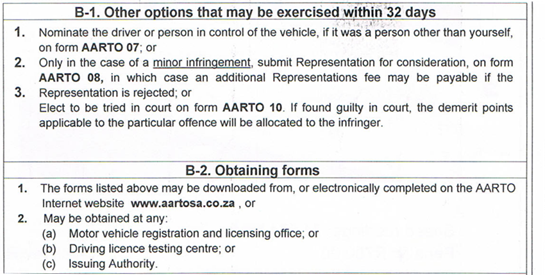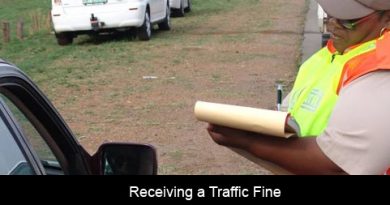What do I need to know about redirecting traffic fines and infringement notices?
Question:
Good Day
My car is registered in moms name, I have accumulated about R10 000 worth of traffic offences over the past 2 years. Is there a way that i can put the fines in my name and make arrangements to pay the fines off on a monthly basis to avoid my mother getting arrested?
Answer:
There are mechanisms under both, the Criminal Procedure Act and the AARTO Act to redirect infringement notices to the driver in control of a motor vehicle and these mechanisms are clearly explained on both, section 341 notices and AARTO infringement notices.
In the case of a notice in terms of section 341 of the Criminal Procedure Act, the mechanism to redirect the notice appears on the reverse of the notice, in a format similar to the one below:
On the reverse of an AARTO infringement notice, the following appears:
The problem is that very few people read much other than the fine amount when they receive fines in the post and it is therefore not common for people to follow the correct procedure and then they wonder why things go horribly awry later. In your case, you have built up – as you say – R10 000 worth of fines in your mom’s name but what you don’t say is over what period of time this has happened.
I am going to presume that this has happened over a significant period of time – or at least hope that it has. This therefore presents a problem in that under the Criminal Procedure Act, nominating the drivers should happen within the time frame preceding a summons. Under AARTO, this timeframe is within 32 days of the service of the infringement notice. If the option of nominating the driver doesn’t occur within the allowable time frame, then theoretically it cannot be exercised thereafter but the fact is that one could use the argument that one has only recently become aware of the redirection option and therefore ask for condonation in order to ensure that the correct person is prosecuted.
In terms of the Constitution, an issuing authority would net be acting reasonably, despite what either Act says if they refuse to accept a nomination of the person who actually committed the infringement – and if they do so, then the defence of pleading not guilty on the grounds that someone was not the person who committed the infringement would have to be accepted by a court. Prosecuting the wrong person based on presumptions contained in Acts – especially where that person makes the effort to ensure that they nominate the correct person is unconstitutional and tantamount to malicious prosecution.
Therefore, despite what is contained in the AARTO Act with respect to the allowable amount of time for nominating the driver, I would say that your mother should immediately and without delay, nominate you as the driver in each and every instance of traffic fines that you have incurred.
Whilst on this topic, I would like to once again clarify the issue of people being arrested for outstanding traffic fines.
- Infringement notices issued under the AARTO Act can NEVER result in a warrant of arrest being issued – no matter how long the infringement notice has been outstanding.
- Traffic fines issued under the Criminal Procedure Act can NEVER lawfully result in the issue of a warrant of arrest unless they are issued in the form of a summons and the person in whose name the summons has been issued and lawfully served ignores it and fails to appear in court on the date specified on the summons. This does not mean that it does not happen however and the following must be borne in mind:
- A summons in terms of section 56 of the Criminal Procedure Act is issued and served on the driver of a vehicle immediately at the time they are stopped for a traffic offence. There is therefore no excuse for ignoring it and would be no need to redirect it to anyone.
- A summons in terms of section 54 of the Criminal Procedure Act is issued when a notice in terms of section 341 of the Criminal Procedure Act is not acted upon and this summons must:
- Be served on the person whose name appears on it IN PERSON at their physical address, provided that it may be served on a person other than the accused who is apparently over the age of 16 years residing with or working for that person.
- Be regarded with the same import as a summons that is issued and served under section 56 in that ignoring it will have serious consequences, including the issue of a warrant of arrest which may be executed at any time.
- Posting section 54 summonses is illegal, but this does mean that traffic authorities around the country don’t do it. If you receive a section 54 summons in the post, you should immediately contact the SA Police Service and lay a charge of defeating the ends of justice against the clerk of the court who sent it to you.
- No-one can ever be arrested legally if a warrant of arrest is issued on a summons that has been posted, however this does not mean that it doesn’t happen. If anyone is arrested in
- In the absence of a warrant of arrest, the arrest of any person for outstanding traffic fines is not only illegal, but constitutes unlawful arrest for which you can and must sue the authority that arrests you for civil damages. These damages are usually significant amounts of cash and can be handled by attorneys on a contingency (no win, no fee) basis.
When all is said and done however, the very best way to deal with traffic fines is to adopt an approach that sees you not incurring them in the first place. Speed limits are meant to be obeyed, not to inconvenience you but to ensure that safe speeds that allow you to stop in time if something happens. But for some bizarre reason South Africans by and large seem to be of the belief that speed limits are optional and/or require a budget for exceeding them to be set aside. This is a very irresponsible attitude to adopt and it one of the reasons that so many people end up crashing, often injuring or killing themselves and others.
The idea behind a fine is supposed to be to discourage delinquent behaviour, but it seems to me that people in South Africa have come to believe that they are nothing more than a licence to commit offences. Our traffic officials have done nothing to change this perception and instead continue to issue fines hand over fist instead of coming up with ways to physically deter delinquent behaviour and/or correct it. It is only when a change in mind-set from both, those who break the law and those who are tasked with enforcing it comes about. Until then, tens of thousands of South Africans will continue to be maimed and killed on our roads, simply because traffic enforcement focuses on revenue instead of remedial measures.
Best Regards,
Howard Dembovsky
National Chairman – Justice Project South Africa (NPC)
Association Not For Gain | Incorporated as a non-profit company under the Companies Act, 2008







